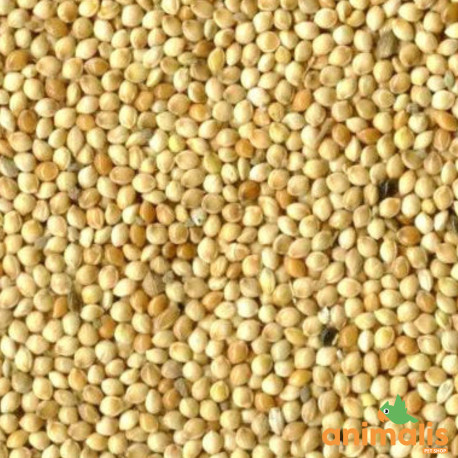



Reference: MILLETBLANC-KG
Dari, also known as sorghum or millet, is a variety of grain that is related to millet varieties. Dari is the size of a hemp seed. The grain originates from the warm regions of Australia, Asia, Africa, and South America. There are three varieties: white dari, yellow dari, and reddish-brown dari. It is noteworthy that more value is attributed to light dari than to reddish-brown dari. Regarding nutritional value, there is not the slightest difference. Furthermore, reddish-brown dari is well appreciated by lovebirds. Dari can be compared to wheat in terms of starch content. The seed has a favourable composition of amino acids. The protein present in dari has a particularly high leucine content.
The Cardy seed is rich in protein and linoleic acid, which helps reduce cholesterol levels and therefore decreases the risk of heart disease. It is found in mixes for budgerigars and parrots, but also for native birds such as bullfinches.
Cardy seeds are high in fat. The amino acid proportions of the seed are very favourable, with a very high arginine content. The seed is low in lysine and methionine + cystine, while tryptophan is completely lacking.
The flaxseed consists of 40 to 45% oil and 25% protein. Flaxseed preserves very well. It contains, in particular, two fatty acids with similar names (both derived from the word "lin"), linolenic acid (an omega-3) and linoleic acid.
The seed is used in animal feed, particularly for laying hens for which an increase in the omega-3 content of the eggs is desired.
Due to these properties, this seed aids digestion.
Niger seed is a bird seed rich in phosphorus and calcium.
Niger seeds (or nyjer seeds) are fine seeds rich in oil.
They come from Guizotia abyssinica (also called Oleiferous Guizotia).
Niger is very popular with most birds, goldfinches and tarins love it.
Niger is one of the few bird seeds with a good calcium/phosphorus ratio.
Sunflower seed contains almost 40% fat, but also proteins, carbohydrates, vitamins B and E. We quantify on a sunflower seed nearly 600 Kcalories per 100 g.
It satisfies throughout the year, the needs of a wide variety of birds, including the smallest of them.
Sunflower seeds are a real treat for our birds who love them!
Properties of Pine or Larix seeds.
Anti-inflammatory, analgesic, antispasmodic,
Antiseptic, anti-infectious (pneumococci),
Decongestant of the small pelvis and prostate,
Diuretic
Expectorant, tonic for the respiratory organs.
Oatmeal or peeled oats are used in the composition of the basic mixtures of canaries and hooked beaks especially during the breeding and feeding period.
Its protein level is quite low, but it is a seed rich in energy.
Crude protein: 13%
Fat: 8%
Carbohydrates: 68%
Phosphorus: 0.4%
Calcium: 0.09%
Thanks to its small black or pretty electric blue seeds, the poppy is recognizable among thousands. A cousin of the poppy, the poppy is known for its content of good fats and micronutrients essential for the proper functioning of the body.
Hemp seeds are highly nutritious and contain more essential fatty acids (EFAs) than any other source and are in second place, after soya, for their richness in highly digestible proteins, of high biological value. They are particularly recommended during the breeding seasons in order to stimulate the reproductive instinct of birds.
Niger, bird seeds rich in phosphorus and calcium. Niger seeds (or nyjer seeds) are fine seeds rich in oil. They come from the Guizotia abyssinica (also known as Guizotia oleifera). Niger is highly favoured by most birds, with goldfinches and siskins being particularly fond of them.
Niger is one of the few bird seeds with a good calcium/phosphorus ratio.
Soybeans are an excellent source of iron, zinc, manganese, copper, selenium, potassium, vitamins, fiber, polyunsaturated fatty acids and antioxidants, in short, it is an excellent dietary supplement.
Soybeans are often used in sprouting seed mixes.
Paddy rice seed or raw rice which is perfect for exotic big-beaked birds such as padda and birds of Asian descent. This seed is also appreciated by parakeets, parrots and exotic doves.
Common names:
Wild teasel, Birds' cabaret, Venus' basin, Wolf's comb [Fr], Grote kaardebol [Nl], Wilde Karde [De], Cardo dei lanaioli, Scardaccione selvatico [Il], Cardencha, Cardo de cardador [Es].

